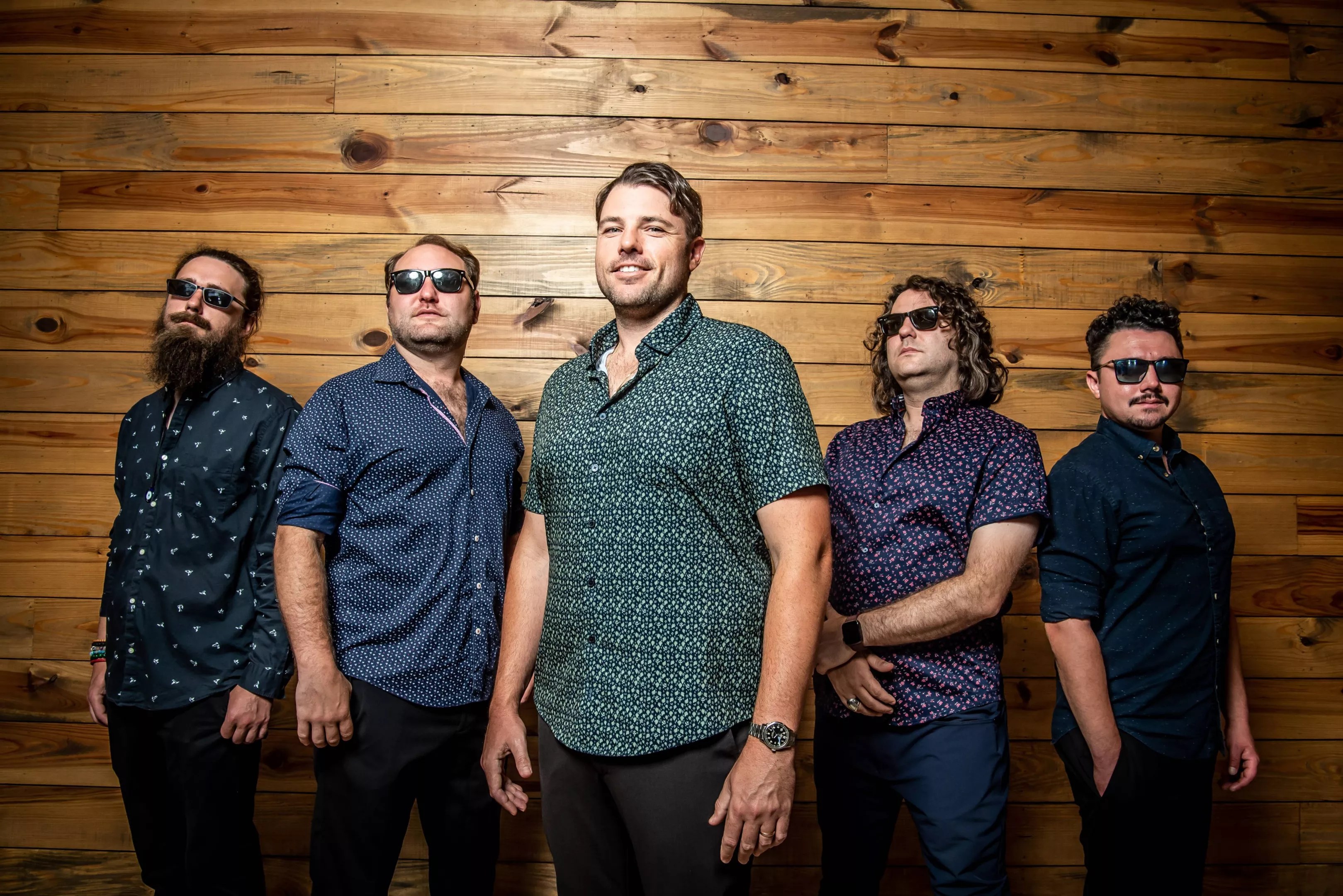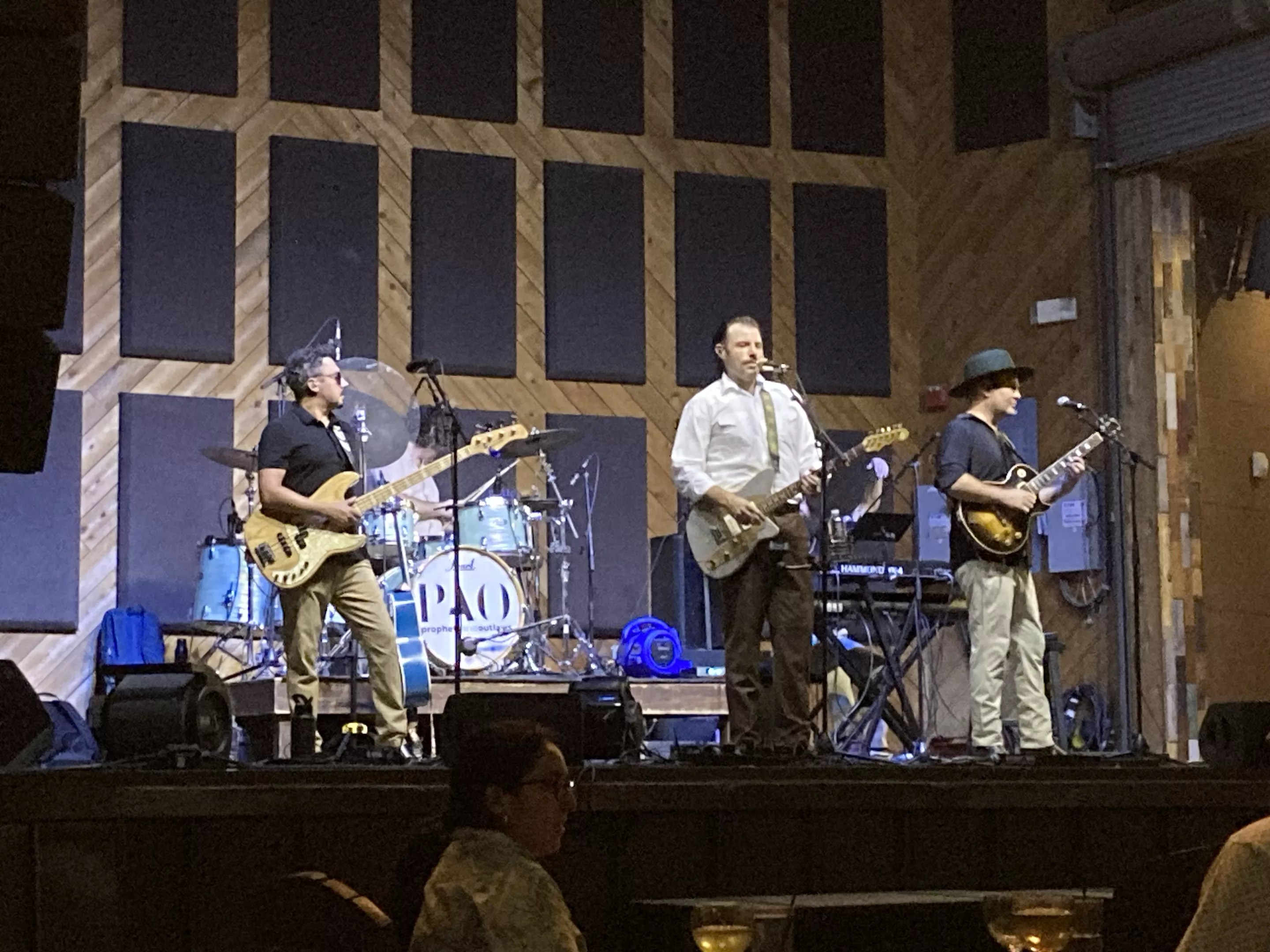
Erick Anderson

Audio By Carbonatix
Dallas-based band Prophets and Outlaws has the knack of making music that feels familiar yet, at the same time, not quite like anything you’ve ever heard before. That combination, at once comforting and stimulating, has helped them rack up 10 million streams on Spotify, more than 1,000 live performances and a string of recordings capped by their May album, Gettin’ Down.
The title track, penned by bassist, vocalist and guitarist Johnny Cooper, captures the energy of their live performances while also displaying their musical heritage in Southern rock bands of the 1970s. One notable example is the solo work on the cut by lead guitarist Steven Guckenheimer, whose brother James drums for the band. Any fan of Duane Allman is sure to recognize some of the passages Steven conjures out of his Gibson Les Paul Signature. And their stage shows are replete with quotes, both musical and spoken, from other acts of the era.
“We play the music we grew up listening to,” James said. But this is no tribute band. The five members are their own men, and this is their own music, albeit with firm roots in the sounds they heard as kids. Still, musical references to artists of the past are respectful shout-outs that embellish the band’s creativity rather than replacing it.
The band formed when Boggs, then 17, buttonholed 15-year-old Steven Guckenheimer in the halls of Jesuit High School and asked him to play guitar in a performance he had coming up. The guitarist recruited his drummer brother and established the nucleus of the band. Dallas native Ringholm joined later, followed by Granbury resident Cooper, who replaced a departing member several years ago.
One puzzle about Prophets and Outlaws is why, with so many streams, they are not more of a household name. It’s not that they don’t get out. Prophets and Outlaws performs live up to 100 times a year, including many private shows along with ample public gigs. They made an appearance at Larry Joe Taylor’s Texas music festival in their early years and, in 2025, impressed listeners with their powerful vocals, lyrical guitar work and engaging songwriting in a featured set at the Kerrville Folk Festival.
Given the many references to oldies, it seems possible they are out of step with modern times. Indeed, a solid base of longtime fans who have seen the band many times includes plenty of people old enough to be the bandmates’ parents. “Even in our 20s, we’d play college towns and have people say, ‘You’re my mom’s favorite band,” Steven said. But at The Rustic on Aug. 15, seats were filled with listeners ranging in age from twenty-something to past retirement. They clearly have broad appeal.
Matt Boggs’ smooth and powerful baritone is perhaps the most appealing and recognizable feature of the Prophets and Outlaws sound. In fact, Steven said, “The Southern Soul comes from Matt’s voice along with our country roots.”

“Even in our 20s, we’d play college towns and have people say, ‘You’re my mom’s favorite band,” Steven Guckenheimer said.
Mark Henricks
Without doubt, they harken back to the Southern rock era. The soul angle is harder to pin down. The well-established elements of traditional soul, such as gospel-style call-and-response, falsetto vocals and horns, don’t exactly define their sound. This part of their identity seems to rest mostly on undeniably Boggs’ soul-stirring vocal quality.
Another potential issue might be the incongruity of five white players calling themselves soul musicians, a genre tightly connected to Black culture. However, blue-eyed soul, music created by white recording artists who faithfully imitated the soul music of the 1960s and later, has resonated with generations of people who dig the genre. Boggs said, “I don’t think we’re the only ones doing this.” Indeed, some other musicians are leaning into the Southern Soul tag these days, including Dallas singer-songwriter Leslie Austin.
Finally, you have to wonder if maybe they just came along a few decades too late after the Allmans, Marshall Tucker and Lynyrd Skynyrd. But the irrepressible Cooper sees them as surfing today’s musical trends, rather than floating behind the current. “There’s a definite rebirth of Deep in the Heart music,” he said. “You just feel it in your heart, all the way up.”
By any name, the band’s music has some striking characteristics, including that they’re all capable vocalists. “We’ve got five singers!” Boggs proclaimed to listeners at the Rustic, before breaking into The Band’s “The Weight,” with each member more than competently taking the lead on a verse.
In addition to showing off their lead abilities, they also frequently engage in five-part harmonies that call to mind music makers like The Eagles and The Band. And when Cooper steps up to sing lead, it’s clear that he is a legit frontman in his own right. Cooper also frequently switches instruments with Steven, displaying chops that would make him the best lead player in many bands.
James Guckenheimer ably supplies backup vocals without slacking the propulsive rhythm that characterizes the band’s mostly high-energy playlist. Jamie “Jelly” Ringholm could almost escape attention behind his racks of keyboards. Until, that is, you hear him take a piano solo that showcases his jazz studies degree, or listen to band members defer to him on matters of harmony. “He’ll tell me which note to play,” Cooper said. “Or at least he’ll tell me you can’t play that one!”
In July, Prophets and Outlaws announced they’ll release Gettin’ Down on vinyl on Sept. 15. On Oct. 11, Josey’s Records will host their vinyl release at 1 p.m. The record, produced by Mark Hornsby, follows a 2019 album preceded by several EPs. Boggs says they were looking for a particular sound for this one.
“For so long we’d get complimented on our live stuff,” he said. “But we were trying to get our feet under us in the studio.”
The Hornsby production, which included the producer playing bass on some cuts, features minimal overdubs in an effort to give it a live feel.
Prophets and Outlaws got considerable exposure while still a very young band. Boggs says the title track off the new album is one of their favorites to play, but the most significant entry in the band’s discography is surely “Soul Shop.” The cut, off their first EP in 2011, got the nascent band on the radio, led to the Larry Joe Taylor appearance and is still their most-streamed song, with nearly two million listens on Spotify.
Since then, the band has prospered without breaking out, while waiting for another, perhaps bigger, opportunity than “Soul Shop” provided. “When that opportunity does come, we won’t fail,” James said.
Until then, perhaps the most natural category they fit into is the one where friends have fun making a living playing music while sharing that fun with fans.